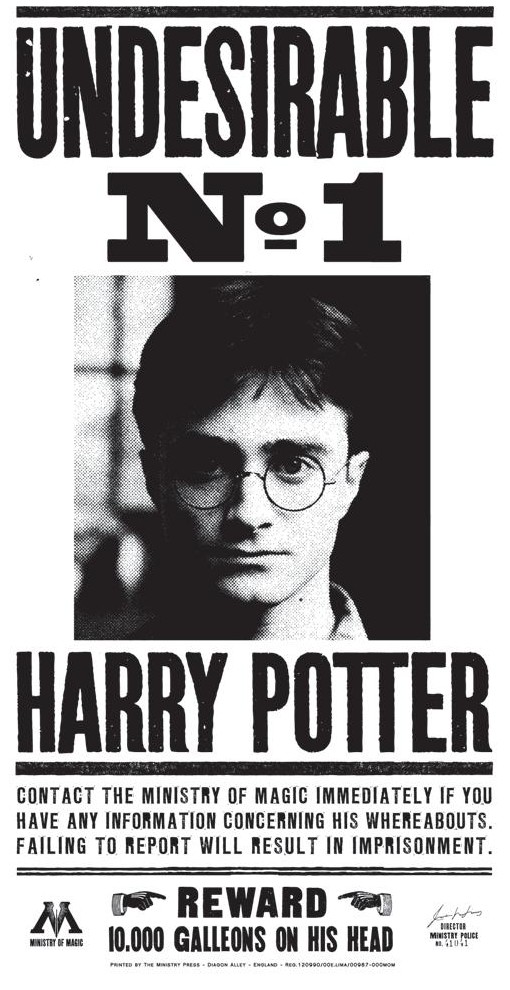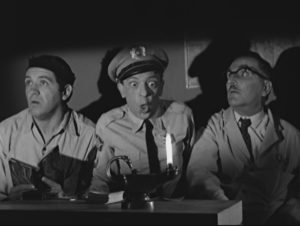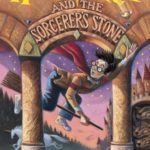Deuteronomy 18 Witchcraft: What It Is and Isn’t
Does Deuteronomy 18 condemn anything labeled “magic”?1
If we love fantastical stories, should we be concerned about their magic? Should parents worry that fictitious magic is a “gateway drug” introducing children to real paganism?
Scripture commands believers not to commit specific sins of sorcery and witchcraft. But if we ignore the actual definitions and intentions of those sins and instead go off to condemn anything that carries the same label, we have wandered into blindness. We have replaced actual biblical discernment with manmade traditions. We’ve accepted the notion that if a command for Christians is good, then a command around the command must be better.
Unfortunately many Christian media-discernment materials — including many that claim to help parents understand fantastical stories — commit this very error of blindness.2

Christian parents often assume witches like Elsa from Frozen and wizards like Obi-wan Kenobi from Star Wars are okay, but this magician is still Undesirable No. 1.
For example, MovieGuide founder Dr. Ted Baehr writes:
God wants us to avoid completely witchcraft and sorcery. […] You must protect your children and grandchildren, therefore, from the occult evils promoted by the Harry Potter books and movies.3
“Wretched Radio” host Todd Friel also condemned the Harry Potter series for this reason:
It’s a sin. Deuteronomy 18. God hates that stuff. I’m not going to ingest that stuff, nor am I going to let my kids [ingest it].”4
This isn’t just about Harry Potter. Christians often fail to realize that “magic” in stories can take many forms. They will open their doors to “the Force” of Star Wars or “pixie dust” of classic Disney fairy tales, but lock all their deadbolts against stories that overtly boast of magical content. You can call the story’s magic “science,” “superpowers,” “the Force,” “alien abilities,” or even magic/miracles that an alternate-world Godlike figure (such as Aslan in Narnia) gives to his followers for his purposes. But it’s still indistinguishable from magic.
Space doesn’t permit a full exploration of fictional magic. But many Christian materials give even less attention to the definition(s) of real occult practices the Bible condemns. For example, The Culture-Wise Family, edited by Ted Baehr, never tries to explore what magic God forbids or the reasons he forbids it. This is a gross oversight. It not only makes many Christians miss fantastical stories in their cultures, but promotes blind legalism.
Deuteronomy 18: Winners don’t do divination
Deut. 18 is the first biblical chapter that concerned Christians cite to defend the belief that Christians must avoid anything that seems to resemble ungodly “magic” or paganism. But what “magic” does Deut. 18 actually address?5
Most Christians who cite the text about magic are thinking of verses 9–12:
“When you come into the land that the LORD your God is giving you, you shall not learn to follow the abominable practices of those nations. There shall not be found among you anyone who burns his son or his daughter as an offering, anyone who practices divination or tells fortunes or interprets omens, or a sorcerer or a charmer or a medium or a necromancer or one who inquires of the dead, for whoever does these things is an abomination to the LORD. And because of these abominations the LORD your God is driving them out before you.”
Deut. 18:9–12
God strongly condemns pagan practices of human sacrifices, then turns to other practices: divination, fortune-telling, omen-interpretation, charming, and necromancy (attempting to speak to the dead). Israel’s neighbors practiced these for anti-God reasons: they wanted to manipulate their own lives, to assure their personal and agricultural fertility. God declares that these things are an abomination in his sight. For his people he sets up another way to assure their salvation and safety: the final Prophet (vv. 15–18), the promise of Jesus Christ.
So in Deut. 18, God really condemns one sort of sin: idolatrous divination, for the purpose of self-protection and manipulation of your environment.
Here God does not address the issue of anything else labeled “magic.” He does not address the questions of whether these pagan strategies actually work or whether they summon Satanic or demonic power. Here he is utterly uninterested in these topics. He only gives one motive for people: their holiness for his sake. “You shall be blameless before the LORD your God … the LORD your God has not allowed you to do this” (vv. 13–14).
New Testament truth: Don’t reject the final Prophet

Peter’s conflict with Simon Magus, 1620 painting by Avanzino Nucci. Peter is in the center, Simon at top right (in black).
The Old Testament seems to offer few other mentions of idolatry-based magic practice.6
The New Testament shows how people still reject Deut. 18’s final Prophet, Jesus Christ, in favor of idolatry. And the NT first mentions some kind of magic — whether street-huckster magic or divination — in the account of Simon (Acts. 8:9–24). When the newly converted(?) magician tries to purchase actual power from the Holy Spirit from the apostles, the apostle Peter strongly rebukes Simon. But Peter places the blame right where it belongs: Simon’s own wickedness and “the intent of [his] heart” (v. 22). In the New Testament as in the Old, bitter and iniquitous people (v. 23) are still tempted toward such idolatrous “magic.”
Two more New Testament texts specifically condemn the sin of sorcery: Gal. 5:19-20 and Rev. 21:8. Each may allude to a broad array of pagan practices, but all based in one sin: to divine the future and manipulate the world, ignoring the final Prophet Jesus Christ.
Conclusion: God hates particular magic for particular reasons
In all these Scriptures we see clear characteristics of the kind of magic that God does hate:
- God condemns divination. Therefore God’s people must trust him alone and reject idolatrous and unbiblical attempts to discern the future and control your own fate.
- God condemns false prophets and their “magic.” Therefore God’s people must reject ideas, things, or people who endorse idolatry and draw attention to themselves.
- God condemns sorcery. Therefore God’s people must reject any other sorcerous method people use in an attempt to divine the divine will for idolatrous ends.
In each case the Bible condemns idolatry that leads to personal magic practice. The sin begins in the person’s heart with a desire to worship something other than God. The sin continues when the person seeks some other means for divining the will of God, the will of other gods, or “fate,” instead of trusting God and believing in his word. That’s sinful magic.
Don’t misunderstand. People are wickedly creative and can use anything to sin: fictitious magic, the English language, even the names of God and Scripture truths. Nothing is good just because it exists or because a Christian enjoys it. Rather, God commands us to receive his good gifts with intentional thanksgiving because they’re made holy for us by the word and prayer (1 Tim. 4:4). But if you are a Christian who intentionally fights sin and has less desire to “divine” the future for idolatrous ends, then you can enjoy made-up magic.
- This article is based on chapter 8 of a pending nonfiction work in progress. ↩
- In fact, many Christian warnings about “witchcraft” can encourage the very sins of divination and idolatrous self-protection that motivate actual occult practices. See Christian Parents, Please Stop Practicing White Magic, Stephen Burnett at Speculative Faith, Sept. 26, 2014. ↩
- “Protect Your Children from HARRY POTTER Occultism,” Dr. Ted Baehr at MovieGuide, undated article. ↩
- Todd Friel, “Wretched Radio” episode dated July 19, 2011, accessed via private archive. ↩
- For a fuller exploration of Deut. 18, see Winners Don’t Do Witchcraft, Stephen Burnett at Speculative Faith, Oct. 31, 2013. ↩
- Prov. 17:8 sounds like a medieval proverb with its colloquial reference to a “magic stone.” Ezekiel 13 includes a far more negative reference to magic wristbands used in divination. ↩













































The only thing I’ve gotta say is that, by the strictest definition, Elsa is not a witch. Yes, in the movie they called it “magic”, but nobody really uses the original definition for magic anymore. The definition for magic is more used like, “Hey, I’m cool. I was born with powers!”. She was born with the ability to turn things into ice like someone is born with the ability to write, draw, sing, etc. Witches aren’t born with super powers.
Just as a side note, I don’t mind books or movies with magic in it.
Harry Potter was born with powers, just like Elsa and Wolverine and Thor and Luke Skywalker, but the poor guy gets all the hate …
Thor is a bad example. If you were a Christian in the Marvel Universe, you’d view Thor as a false god, because he’s the personification of the Norse deity. Luke is also a bad example, because the Force is definitely an anti-Christian metaphysical system. HP uses magic, but a new trope is that magical capacity is genetic; doesn’t change the fact that he straight up uses divination and other classical magic tropes.
One of the arguments fundamentalists use is that often the best way for demons to deceive people would be to make magic into a natural force in order to hide their existence. It used to be a trope in Christian fiction, or end-times stuff. Like The Archon Conspiracy did this for UFOs-demons masquerading as aliens because people believe naturalistic explanations better than straight up witchcraft.
I don’t think the arguments are correct, but it’s a bit more sophisticated than that.
“You haven’t proven from Scripture that ‘reading about someone sinning’ is equivalent to actually sinning, much less that ‘reading about someone doing made-up natural-law/birthright ‘magic’ for non-idolatrous reasons is equivalent to idolatrous occult participation.’ ”
“Train up a child in the way he should go: and when he is old, he will not depart from it. Proverbs 22:6”
I agree 100% that the sin is not in what we see, watch, or read, or listen to. We, as adults, are able compartmentalize what we absorb into categories of “right” and “wrong”. Children, not so much. It’s the parent’s responsibility to train a child in discernment.
Unfortunately, many parents miss this important step. Just because an adult knows how to read a book without being influenced by it does not mean their child has inherited the same discretion. Without open and continual discussion with our children about why the use of ‘magic’ or ‘force’ or ‘enchantment’ in the book or movie or television show should not be repeated, and the biblical reasons why, children will become desensitized to the idea of idolatry.
“…each person is tempted when they are dragged away by their own evil desire and enticed. Then, after desire has conceived, it gives birth to sin; and sin, when it is full-grown, gives birth to death.
James 1:14-15”
A child sees Elsa creating a castle to run away, and the seed implants in their heart. They read how Harry Potter resolves his problems with magic, and the seed implants in their heart. They see the genie make Aladdin a prince, and the seed implants in their heart. IT ALL STARTS IN THE HEART. That seed lies dormant until they are older, facing issues of pre-teen and teen years, and the seed begins to grow: you can run from this. You can find your own solution out of this. You can make this happen on your own.
The issue doesn’t even have to do with ‘magic’… it has to do with the seed that is planted. God is much more concerned with the heart than he is with a book.
As parents, it’s our responsibility to not only talk about the magic, but to talk about the REASON why the character used the magic. Training a child isn’t about teaching them to avoid the magic wand, but to understand why the witch felt the need to seek out a magic wand, and where true power comes from; to not only teach the child the good principals behind a story but to also point out the things that the characters did that are in contradiction with God’s desire for our laws. Since children don’t have this discernment until later in life (some do, but many do not), it’s our responsibility to break it down with them.
Curiously enough, there are multiple instances in the Bible of witchcraft (meaning sorcery or magic) working. In the account of the Ten Plagues, Pharaoh’s magicians performed, by their “secrets arts”, some of the same miracles that Moses did: turning a staff into a snake, water into blood, and summoning frogs up from the Nile. The plague of gnats was the turning point; the magicians tried to imitate the feat but could not, and told Pharaoh, “This is the finger of God!”
In Acts, we have the story of a slave girl who was a genuine fortune-teller – by a spirit.
There is also the mysterious account of Saul consulting the witch of Endor, and a description of Nebuchadnezzar engaging in divination – and receiving the answer to march on Jerusalem, just as God had decreed he would.
Balaam also used sorcery, and he was regarded as very efficacious. “Those you bless are blessed, and those you curse are cursed.” God later declared that He had “delivered” Israel by not permitting Balaam to curse them, so it would seem Balaam had some power.
So the problem with magic (in the Biblical sense, not the Disney sense) probably goes deeper than simple idolatry.
Agreed.
But notice my intentionally tight focus in this article. I didn’t try to say — and would not say — that Satan has no real power, or that people (then or now) are able to be used of Satan/demons/spiritual villains to accomplish false miracles that we could call “magic.” Instead I said that here in Deut. 18 God simply isn’t interested in that topic.
So my recommendation becomes:
If God in this key text doesn’t care about whether the “magic” actually works or whether there are demons behind it, and if His only given motivation in this text is “you shall be blameless before the Lord,” let’s not go beyond what Scripture says when we cite Deut. 18 about witchcraft.
Agreed. But yours seems a far more biblical and better approach than many reactions to “magic.” Many parents believe or simply things like, “If my child gets exposed to fictitious ‘magic,’ then he/she will want to get into the occult.” This treats the “thing” as if it’s some corruptive force all on its own. But it’s not. It starts with personal idolatry.
I’m pretty sure I expressed last time that I find it hard to even care about this because it is, after all, fictional and/or superstitious. But since I’m big into free will, I have to say that I don’t really like your conclusion that God doesn’t like people doing what little they can to affect their lives. For one, I don’t believe God is a micromanager (hella lot of problems with theodicy otherwise), so we’re mostly left to our own devices anyway. People, after all, only have so much control over their lives, and I can’t begrudge them trying to make it as little crappy as possible (with the obvious caveat that they don’t harm others).
So my take is that the motive behind the witchcraft prohibition is not against people who try to do as much as they can to keep their lives as little crappy as possible, but against those who get waaaay to absorbed in control-freaking destiny/future/whatevs that they end up doing crappy things in the here and now, like human sacrifice. Or those who exploit the people who are afraid and want (the illusion of) control. *Ahemahem* like fire-and-brimstoners who use it to manipulate people into the fold.
Eh, Notleia, with this comment (as with the one below), your views won’t be making much of a dent in the views of Christians who believe Scripture is more authoritative than the personal opinion of strangers/internet friends (however friendly they are 🙂 ).
I have no idea where you’re reading this.
First, I’ve done my best not to draw any personal conclusion that is outside the text. Take it up with the Bible and its professed divine Author. 🙂
Second, you seem to have misread what I meant by trying to control one’s own life using means that God has forbidden. There is no “neutrality” here, not for the Christian. A thing is either enjoyed with thanksgiving with the glory of God, or it’s used in a way that rejects His love. In Deut. 18 God warns His people against divination, charms, necromancy and such, not because He despises free will (nonsense) but because He has a better way: the word of the final Prophet, Jesus Christ.
Third, it sounds like you care far little for Jesus Christ personally and would rather spend your life fighting “fire-and-brimstoners.” We have common enemies there, but that’s a boring way to live your life.
Yes, it is frustrating. Horse to water, can’t make it drink, blahblah. But for some reason it gets under my skin that people don’t or refuse to recognize that it’s alllll interpretation. ALL of it. Even literalism and Sola Scriptura (which wasn’t even invented until Protestantism was).
As for controlling one’s destiny thing, that’s a nebulous sort of idea that I see building up in the theological corners that nobody bothers to sweep out. Remember when some people were losing their crap over non-procreative sex on here? See, the only thing I think up that justifies that, theologically, is that it’s wrapped up in the oh-so-pious piety of “God’s will over self will.” And it sounds like more of the same sort of oh-so-piety kind of thing to condemn witchcraft specifically because of the desire to exercise control over one’s fate (especially when you don’t offer much by way of elaboration on that). And “God’s will over self will” is in pretty direct conflict with free will.
And that’s what my question is about, why witchcraft is forbidden. Is it because of the motive to control one’s fate, because I just blathered about my problems with that in the previous paragraph. If it’s not specifically that, then what is? My preferred theory was because witchcraft could easily cause harm to people (in much the same way fire-and-brimstoners do). I dunno whether or how much you would agree with that.
As for your last paragraph, that’s kind of an insulting assumption to make. I don’t talk about Jesus because it’s not Jesus I have a problem with, but religion.
These scriptures might help:
Jeremiah 2:11, 13
It’s not really controlling your own destiny, but the act of choosing what is worthless to guide you over the God who does have power to help.
Several things strike me here about your interpretation of this entire subject. I have the distinct, very distinct impression that you don’t believe magic is real, therefore “fictional magic” is okay. Another comment has dealt with this, so I won’t. What is more serious is you want “magic” to be okay. It’s not. The practice of magic, any magic in this world, is condemned by God not merely for the reasons you state but also because it is Satan’s “hand,” to use the OT figurative language. It’s real and it works because someone makes it work for them. But my greatest concern is your insistence that magic is “okay” if it’s not in the context of pagan idolatry. Therefore all the magical practices in Potter are good because they’re not actually worshipping false gods. This is like saying it’s okay to have sex with a prostitute as long as it is not in a temple or a grove context. It’s “okay” because it’s not in the context of false worship. Is that true? Of course not. God calls magic “toevah” in Hebrew — abomination, but are you aware of what that word actually means? The sight of something so disgusting, so revolting, it makes you vomit at the very sight of it. God doesn’t think magic is “okay,” it makes Him puke. The practices of magic are condemned by God, period, no matter what the “context” is. You are the one trying to do a “runaround” a commandment of God so clear there can be no “perception” to misunderstand. I’m not speaking of the “fictional magic” of other worlds like Narnia, like Middle-earth, even the alternate fantasy “Norway” of Frozen. I am speaking of Harry Potter and the like firmly set in this world with the unbliblical worldview that practicing these things is okay. I believe you and others are working toward the establishment of a mindset where it will be acceptable for a “christian” hero or heroine to use magical practices, a “christian” Potter. It has probably already been written but we must create the atmosphere for it to be accepted first. But it is not accepted. Not by God. Not by the Words of YHWH. Magicians are always the enemies of God, not His servants. Christians do not practice “fictional magic,” for magic NOT FICTIONAL. It is the enemy of God. Those who serve it are the dogs outside the city. If a story is ever published with a “christian” protagonist using the magical practices God condemns, then we have truly arrived. At the Tashlan Lewis warned us of, where truth and lies, Christ and Satan, become indistinguishable. As for me, I’ll stand with God and call magic what He does: toevah — to be shunned, even in our writing, rather than adored.
I haz a confused. You for seriously really real believe that magic is real? Um, why? And I don’t understand your distinction between Harry Potter and, specifically, fictional Norway in Frozen. They are both fictional takes on regions of this factual Blue Marble of ours.
(Also, I have heard from Jewish sources that toevah is not a perfect synonym with “abomination.” Apparently it’s a term relating to ritual cleanliness and not morality. And I have never heard anyone conflate ritual cleanliness with morality. That is, after all, the point of the Levite in the Good Samaritan story, that they are not the same thing.)
Glad to engage. But note again that in this article I’ve intentionally narrowed my focus to Deut. 18 and the related Scripture texts that directly warn against sorcery, et. al.
I don’t take into account each and every narrative that would indicate the Devil has powers or that people can/could wield those false miracles in some way. Instead what I point out is this: every time that I’ve found God warning against occult practice, He does so based on His own Name’s sake and His requirement that His people be blameless. I don’t see Him warning in the same reactionary ways that some well-intended Christians do today, e.g. “don’t touch that or a demon might get you apart from your own free will just because you got too close.” Instead His warnings are proactive: avoid this because “you shall be blameless.” His warnings are in a covenant context: I brought you out of slavery, and you’re signed up for life. So trust me and my right to guide you and share my words with you, and do not trust in this perversion of my sovereignty and my revelation.
Nope. In some sense I’m not even interested in the question of whether “magic is real,” that is the harmful stuff. It’s enough for me to know that it’s idolatrous. I may err on the side of reductionism here, but if God’s word is sufficient (and it is), and God never thought He needed to spell out the details of what happens when you have idolatry and mess with the dark side, then why should I ask more questions? Why should I feel that it’s not enough to say, “God says to avoid it because we must be holy?” Why should I stack on top of that other warnings: “If you even get near it the demons will get you”?
On this topic I feel very much like Rebecca in her Monday article. Rebecca said she doesn’t much personally care about whether aliens exist. I care a little bit about that. But I don’t give a fig for the topic of whether real-world magic actually works, or how you could access that power by what degree of idolatry and occult participation. It’s enough for me to know that occult practices offend God and are not holy.
For that reason, why should we bother with saying more than, say, Paul’s strongly written warning that he doesn’t want the church to be participants with demons? (1 Cor. 10:20 — and note that the whole context of that passage is the evils of idolatry.)
I’m not sure from where you’re getting this. What I’ve done in this article is tightly focus on a very narrow aspect of the discussion: the use of Deut. 18. What I’ve said is not merely based on justifying fictitious “magic,” and certainly has nothing to do with justifying “any magic in this world.” Instead I’m asking the question: What does Deut. 18 actually say about occult practice, and why does God warn against it? So far my central points stand: that God forbids certain practices for certain reasons — because they are motivated by idolatry that rejects His word.
In this text, He was not interested in whether the “magic” worked and He said not a thing about Satan or whether occult practitioners were involved with Satan. All He said in this oft-cited text was: “You shall be blameless before the LORD.”
What I am saying is that it’s not the same as the biblical definition of “magic.” It’s not even close. You might as well say we should avoid “devil’s food cake” because it has the word “devil” in it. Drastic example, but same principle. The actual Devil has nothing to do with “devil’s food cake” and actual occult idolatrous magic has nothing to do with fictitious “magic” — broomsticks, wands, et. al. — that does not exist in the real world.
Actually it’s biblically defensible to read content about idolatry or sin. If the Potter stories did involve false-god-worship, a mature Christian could still read them (but they would not be nearly as enjoyable — reading about other people’s idolatry is very, very boring). Daniel learned about all kinds of idolatry in Babylon and even passed his exams at the Babylonian Hogwarts. Yet he was holy and God was with him (Daniel 1).
Nonsense. What you actually seem to be saying is that it’s wrong to have sex with a spouse because it kind of bears a cosmetic similarity to prostitute sex. But … we can quibble over analogies for dozens of internet comments on end, amen, but the real fact remains that you haven’t given any Scriptural support for drawing these commands around the actual command (it’s well-intended but Talmud-like). You haven’t proven from Scripture that “reading about someone sinning” is equivalent to actually sinning, much less that “reading about someone doing made-up natural-law/birthright ‘magic’ for non-idolatrous reasons is equivalent to idolatrous occult participation.”
“Magic.” As the Spaniard said, “You keep using that word …”
Scripture and specific applications, please? Else we should move on (and that wouldn’t be too awkward because we usually agree on things here at SpecFaith, friend).
That apples-and-oranges word swap again. I have argued above that Deut. 18 addresses a real-world idolatrous magic, and the corollary is that Potter-magic, et. al, have no similarity to that — unless we decide that “magic” only ever has one meaning (but that would rule out Narnian magic, Middle-earth magic, and other magics you seem to allow).
“Firmly set in this world.” There seems to be confusion about this. If someone came up to me and thought that Harry Potter were actually “set in this world,” I would set him/her straight with a quick lesson on imaginary versions of the real world (I like the term “elseworlds”). But those people aren’t here — with one possible exception. 🙂 You seem to have a genre confusion. Harry Potter isn’t set in “this world,” any more than Jesus’ parable of the prodigal sons isn’t set in “this world.” Harry Potter is set in another version of this world in which there happen to exist specially gifted people with magical abilities (birthright magic, just like someone born with superpowers, not spiritual magic).
If this troubles your conscience, then I would not try to spiritually strongarm you. But I would point out that you’re already compromising if you enjoy Narnia — The Magician’s Nephew long preceded Potter with its tales of magicians and magic in “this world”! You are also compromising if you enjoy Star Trek, set in a future version of “this world” with plenty of alien magics, and if you enjoy any superhero story in which “science” or “mutations” grant mortal humans fantastical abilities — this is just “magic” under another name. But of course, I would rather you not get nervous about all of these things in addition to Harry Potter. I would rather you see what I’ve contended above: that you cannot be faithful to Scripture and make blanket statements like “God hates all magic!” etc. without actually dealing with my explorations of direct texts like Deut. 18.
Then you’ll need to disregard The Voyage of the Dawn Treader in which a magician is shown to be the servant of Aslan. Or The Lord of the Rings with magic elves and wizards. I can already feel you blanching, though: those stories are okay! How come? Familiarity? Knowledge that they’re safe and in fact you’ve enjoyed them with personal thanksgiving to God (1 Tim. 4:4)? I won’t argue with that. I’ll only that say that for Harry Potter I feel the same way. When I enjoy those stories, I do not sin. And so you really have no option besides 1) re-evaluating your contention that no one can enjoy these stories as good things, 2) calling me a plain old liar who must repent.
You’re alluding to Rev. 21:8, but allusions will not do. It’s irresponsible to float above the surface of the text like that, kinda suspecting that it supports your beliefs about this topic but not actually digging in deeper to see if it actually does (or actually responding to challenges from someone who has tried to dig a little deeper!). This can unfortunately allow feelings, personal “convictions” (e.g. scruples) to dictate your judgment. That is okay if it’s for you personally, perhaps in case you’ve had a background in occult practices and can’t help being tempted back to that by stuff that has “magic” in it. But no, it’s not okay if you end up getting worked up about the topic and suspecting (or claiming outright) that Christians who feel differently about it are unholy or less spiritual.
And I would stand side by side with you if a story is ever published in which a Christian protagonist “practices divination or tells fortunes or interprets omens,” or is “a sorcerer or a charmer or a medium or a necromancer or one who inquires of the dead,” or “listen[s] to fortune-tellers and to diviners.” Fortunately it seems that of all the flaws that could creep into Christian stories, this isn’t one of them that I’ve seen. Unfortunately there’s already enough divination/fortune-telling going on in much Christian nonfiction — e.g. Heaven Is For Real, Jesus Calling — that we must reject.
Once more, with feeling: the real issue here is whether I’m right about specific texts such as Deut. 18, and the direct warnings against idolatry and sorcery in the NT. (Biblical narratives, casual Hebrew word studies, implications, arguments by outrage, etc., count less than commands God has actually given us in His sufficient word.)
One final note: I approach this topic as a reader and lover of stories, before even caring to talk about writing. Everyone always wants to talk about writing. Writing this, writing that. Talking and writing about writing has long since become dull to me.
But that’s neither here nor there.
Don’t do divination. Deut 18.
Here use these bits of the ephod to do divination. 1Sam 14
https://en.wikipedia.org/wiki/Urim_and_Thummim
Picture this. I start up a game of the fantasy MMO Guild Wars 2 and make my character a Guardian: a noble defender of …something…? with power from… who knows where? He’s dignified, moral, helps people with their farms, and defends the lands from the warlike centaurs. He fights using “spirit weapons,” “sigils,” “arcane powers,” etc. Lots of glowing blue stuff flying everywhere, blue fire burning the enemies, talk about “blessings” from fictional “gods” in the ingame world, etc. The Guardian is similar to the Paladin archetype in other fiction. Meanwhile, other players are running around casting spells as the “Necromancer” class.
It’s so weird typing this all out. Should a Christian have any part in playing a game like this? If so, what kind of a mindset should he have while playing? What does God think of this? Are fantasy stories/worlds with spiritual themes inherently evil? What if my character is “the good guy”? What if I never want to do any sort of magic in real life but I like playing games that happen to have those kind of themes?
What do you guys think of this?
Picture this. I start up a game of the fantasy MMO Guild Wars 2 and make my character a Guardian: a noble defender of …something…? with power from… who knows where? He’s dignified, moral, helps people with their farms, and defends the lands from the warlike centaurs. He fights using “spirit weapons,” “sigils,” “arcane powers,” etc. Lots of glowing blue stuff flying everywhere, blue fire burning the enemies, talk about “blessings” from fictional “gods” in the ingame world, etc. The Guardian is similar to the Paladin archetype in other fiction. Meanwhile, other players are running around casting spells as the “Necromancer” class.
It’s so weird typing this all out. Should a Christian have any part in playing a game like this? If so, what kind of a mindset should he have while playing? What does God think of this? Are fantasy stories/worlds with spiritual themes inherently evil? What if my character is “the good guy”? What if I never want to do any sort of magic in real life but I like playing games that happen to have those kind of themes?
What do you guys think of this?
I am very late to this party and would just as soon omit commenting. However, there are numerous errors within your article which should be addressed. Some things you did in error:
1. Put too much emphasis on Deuteronomy 18 (yes, you did mention some other passages, but you left a lot out–just one example: the Egyptian magicians who confronted Moses and Aaron)
2. Narrowed down the focus of Deuteronomy 18 to divination, when the passage also makes reference to Pagan sacrifices and thus arguably the entire Pagan religious system, which included much more than divination.
3. You admitted that “sorcery” in the New Testament includes a wide variety of practices, which you summed up as “to manipulate the world”–which INCLUDES EVERY IMAGINABLE MAGICAL PRACTICE OTHER THAN DIVINATION, which is also included…yet you downplayed the role of manipulation of the world, even though you mentioned it, and still focused on divination.
4. In short you tried to answer the real question about magic and what it means by narrowing the definition of magic to “divination” which is not all that magic is in Scripture by a long shot (again, reference the sorcerers who opposed Moses and Aaron–were they primarily or secondarily doing divination work?) as you briefly then absent-mindedly say yourself. The actual definition of magic is better as “supernatural power that comes from a source other than God”…but in fictional stories, the entire world may be in effect supernatural in a way that is natural in the story world. Or what is a supernatural power may be natural for a character in a story. So the issues in magical worlds are a lot more complicated than you make them out to be. But when a real person in the real world seeks to manipulate the world via means other than God–that’s magic. Real magic, even if it isn’t divination…
5. Another question is if the actual portrayal of magic itself will cause a person to become a modern Witch or Neo-Pagan, because that’s the actual danger, rather than some Christians thinking that merely referencing magic will invite Satan into your life somehow (something the Bible never actually says). NO, not directly, but there can be a stirring up of curiosity, a desire to learn more. Arguably this could be subverted by portraying real magic but then showing it in a negative light. Certainly though it is not inherently legalism to be concerned about the potential for the portrayal of magic to harm people.
It is a reasonable concern to wonder about the effects of portraying magic on Christian young people, but the danger in Christian families is rather remote. So a parent should take reasonable precautions to talk about the reality of Paganism in the modern world and explain why fantasy magic isn’t the same. But one should not pretend only divination was meant, so you can forget about everything else being any kind of potential problem–that’s poor methodology–it just isn’t TRUE–and therefore can lead people in the wrong direction.
What about people like Minister Andrew Wommack?
Or people that heal with energy? Like quantum touch healers, or reiki.
Hello there, Tyra. Hope you enjoyed reading this (older) article of mine.
I don’t know who Minister Andrew Wommack is. But if the chap is trying to harness mystical methods to control his world, or the future (even dressing up these methods with God-talk), that’s witchcraft.
I daresay the same would go for “people that heal with energy.” That’s not a biblical belief. 🙂
God does not want us to suffer. He has given us the gift to heal, and heal others. There is no such thing as witchcraft.
Is it a sin to watch Disney movies even though some don’t contain magic like the movie Up?